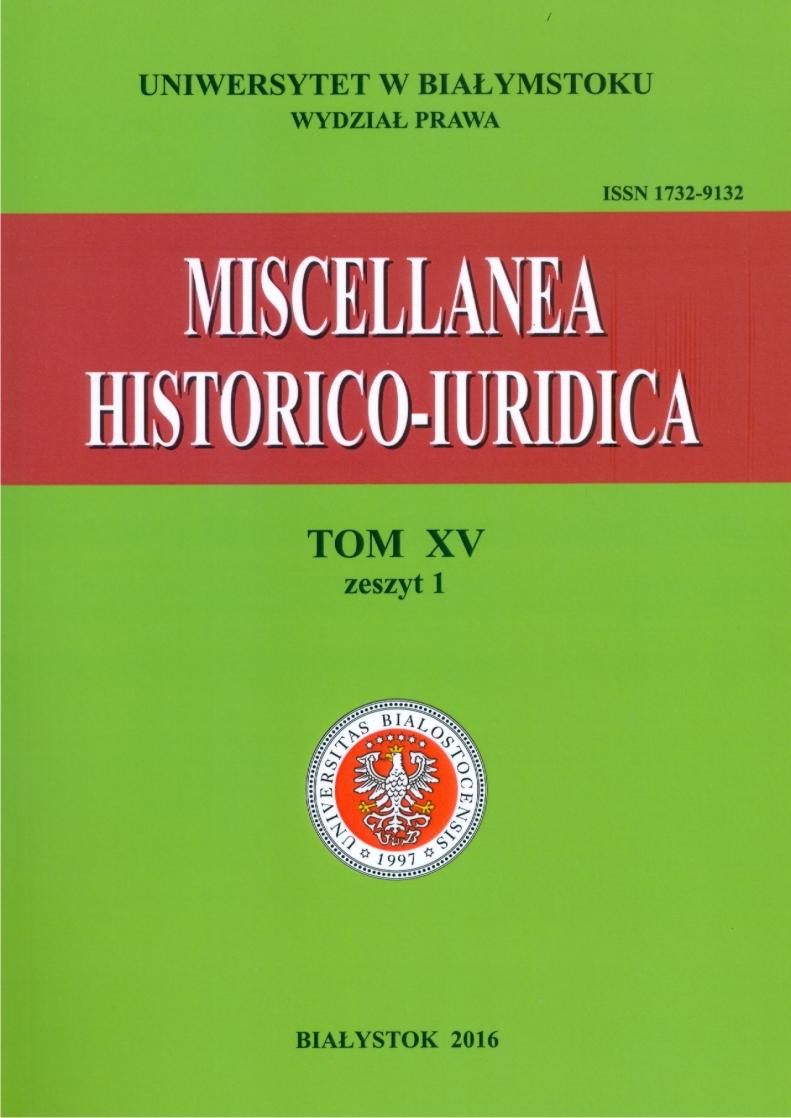The scale and the causes of the orphan works issue in the historical context
Keywords:
orphan works, copyright law, intellectual property lawAbstract
Analysis of principles of copyright and positions of representatives of philosophical thought evolving over the centuries, appointed to justify the establishment of copyright, leads to the conclusion that there has not always existed the possibility to orphan a work. The creation of the problem of orphan works is closely connected strictly with changing paradigms of orphan works. There is the correlation between the age of work and the scale of orphan works – the older the work, the more likely that you will not be able to establish proper communication with the holder of the copyrights. Resulting from the Berne Convention the principle of non-formalism in copyrights protection is a challenge for the modern science of intellectual property rights. It remains an open question about the possibility of dynamic interpretation of treaty solutions by taking into account, in particular, a teleological interpretation and recognition ensuring the fullest possible protection of authors of works as that of the main aim of the creators of an internation - an agreement from the nineteenth century. The changing conditions of exploitation of works in the age of development of technology could be invoked to justify the introduction of certain formalities to ensure effective mechanisms of copyrights protection and to prevent the phenomenon of orphan works.
References
Banasiuk J., The requirement of a diligent search for the rights-holder as a central element of the institution of orphan work, „Zeszyty Naukowe Uniwersytetu Jagiellońskiego. Prace z Prawa Własności Intelektualnej” 2016, z. 132.
Brito J., Dooling B., An orphan works aff irmative defense to copyright infringement actions, „Michigan Telecommunications and Technology Law Review” 2005, nr 12.
Bronder V., Saving the Right Orphans: The Special Case of Unpublished Orphan Works, “Columbian Journal of Law & The Arts” 2008, nr 31.
Bunce A., British Invasion: Importing the United Kingdom’s Orphan Works solution to United States Copyright Law, „Northwestern University Law Review” 2014, t. 108, nr 1.
Copyright, and the Regulation of Orphan Works: A comparative review of seven jurisdictions and a rights clearance simulation, Research commissioned by the Intellectual Property Office, and carried out by: Marcella Favale, Fabian Homberg, Martin Kretschmer, Dinusha Mendis and Davide Secchi, 2013/31, https://www.gov.uk/government/uploads/system/uploads/attachment_data/file/312779/ipresearch-orphan-201307.pdf (03.06.2015).
Copyright Reform and the Takings Clause. Can Congress retroactively shorten the copyright term?, “Harvard Law Review” 2015, t. 128, nr 3.
Dietz C., Werkintegritätsschutz im deutschen und US-amerikanischen Recht, Berlin 2009.
Durantaye K. de la, Finding a Home for Orphans: Google Book Search and Orphan Works Law in the United States and Europe, Fordham Intellectual Property, “Media & Entertainment Law Journal” 2011, nr 21.
Durantaye K. de la, How to Build an Orphanage, and Why, “Journal of Intellectual Property, Information Technology and Electronic Commerce Law” 2011, t. 2.
Final Report on Digital Preservation, Orphan Works, and Out-of-Print Works, 2010: Digital Libraries High Level Expert Group – Copyright Subgroup, http://ec.europa.eu/information_society/activities/digital_libraries/experts/hleg/index_en.htm.
Gompel S. van, Formalities in Copyright Law: An Analysis of their History, “Rationales and Possible Future” 2011, nr 296.
Grages J.M., Verwaiste Werke. Lizenzierung in Abwesenheit des Rechtsinhabers, Tybinga 2013.
Hansen D.R., Hashimoto K., Hinze G., Samuelson P., Urban J.M., Solving the Orphan Works Problem for the United States, “Columbia Journal of Law & the Arts” 2013, t. 37, nr 1.
Hishinuma T., Orphan works: vitalization, modification, and creation of an international norm, “Journal of Intellectual Property Law & Practice” 2012, t. 7, nr 6.
Jänich V., Geistiges Eigentum: eine Komplementärerscheinung zum Sacheigentum?, Tubingen 2002.
Lifshitz-Goldberg Y., Orphan Works WIPO Seminar – May 2010 Lecture Summary, www.wipo.int/edocs/mdocs/sme/en/wipo_smes_ge_10/wipo_smes_ge_10_ref_theme11_02.pdf.
Lu B., The orphan works copyright issue: Suggestions for international response, “Journal of the Copyright Society U.S.A.”, Spring 2013.
Lüder T., The “orphan works” challenge, "Gewerblicher Rechtsschutz und Urheberrecht Internationaler Teil" 2010, nr 8-9.
Mausner J.O., Copyright Orphan Works: A Multi-Prolonged Solution to Solve a Harmful Market Inefficiency, “Journal of Technology Law & Policy” 2007, nr 12.
Michalak A., Kierunki implementacji dyrektywy 2012/28/UE (dzieła osierocone) do prawa polskiego, „Europejski Przegląd Sądowy” 2013, nr 10.
Möller F., Verwaiste Werke. Eine Analyse aus internationaler Perspektive, UFITA-Schriftenreihe t. 272, Baden-Baden 2013.
Peifer K.N., A legal view of selected aspects and the development of Digital Europe, “Gewerblicher Rechtsschutz und Urheberrecht Internationaler Teil” 2010.
Report on Orphan Works, A Report of the Register of Copyrights. January 2006.
Response by the Cornell University Library to the Notice of Inquiry Concerning Orphan Works, 70 FR 3739 January 26, 2005, http://scireg.org/us_copyright_registration/orphan/comments/OW0569-Thomas.pdf (03.06.2015).
Response to Notice of Inquiry about Orphan Works, Federal Register (January 26, 2005), Vol. 70, No. 16: 3739-3743, http://www.copyright.gov/orphan/comments/OW0537-CarnegieMellon.pdf (28.07.2015).
Springman C., Reform(aliz)ing Copyright, “Stanford Law Review” 2004, nr 57.
Stanisławska-Kloc S., Utwory „osierocone“, „Zeszyty Naukowe Uniwersytetu Jagiellońskiego. PWiOWI” 2007, z. 100.
Statement of Marybeth Peters The Register of Copyrights before the Subcommittee on Courts, the Internet, and Intellectual Property, Committee on the Judiciary, United States House of Representatives 110th Congress, 2nd Session. March 13, 2008 The “Orphan Works” Problem and Proposed Legislation, http://www.copyright.gov/docs/regstat031308.html.
The European Digital Libraries Initiative, Sector-Specific Guidelines on Due Diligence Criteria for Orphan Works (2008).
Tomczyk S., Czas trwania autorskich praw majątkowych, [w:] Ustawa o prawie autorskim i prawach pokrewnych. Komentarz, red. E. Ferenc-Szydełko, Warszawa 2014.
Ulmer E., Urheber- und Verlagsrecht, Berlin-Heidelberg-New York 1980.
United States Copyright Office. Orphan Works and Mass Digitalization. A Report of the Register of Copyrights, June 2015.
Vuopala A., Assessment of the Orphan works issue and Costs for Rights Clearance, European Commission DG Information Society and Media Unit E4 Access to Information, May 2010.







